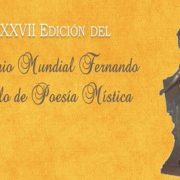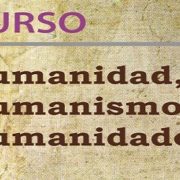Message from Jesús Fernández Hernández for the Forty-First Award Ceremony of the Fernando Rielo World Prize for Mystical Poetry
Rome, December 18, 2021
I extend my warmest greetings to the distinguished members of the Jury, to all the ecclesiastical and civil authorities, to the organizers of this event, and to all those who are online—lay people, priests, and religious—that have wished to accompany us in this Forty-First Award Ceremony of the Fernando Rielo World Prize for Mystical Poetry, which we are holding in this format because of the ongoing pandemic.
I am also addressing the ten finalist poets, who, having been chosen from among the 267 participants from 29 countries, have received recognition from the Fernando Rielo Foundation through the Jury’s judgement, which has been published in the international press. Our greetings, finally, to all the participants—many of them present online for this solemn event—whom we thank for their dedication in offering us their contributions and expressing the best of themselves.
If we want to know precisely what mystical poetry is, we must take into account, first of all, what poetry really is. Poetry, in Fernando Rielo’s opinion, is born with man. There has been no event that has not deserved the mausoleum of a poem. He assures us that “this greatness of language is due to the fact that poetry recreates what science cannot: the suffering thought of human creatures that cannot decipher the mystery of themselves.”[1] Poetry is inside the human being, but “it becomes a poem when the multiple resources of a language are placed at the disposal of the chosen aesthetic images that evoke the truth, the goodness, and the beauty of the cry of love.”[2]
If I refer to current poetry, I agree with Fernando Rielo that many poets have followed so-called “weak thinking.” This World Prize for Mystical Poetry, in its forty-one years of existence, has had the mission of confronting “weak poetry,” which has been running away from the natural effort and the inner demand for inspiration. “Inspiration,” Federico García Lorca used to say, “is fine, but you’d better hope it catches you working.” These are the textual words: “If it is true that I am a poet by the grace of God, it is also true that I am a poet by the grace of technique and effort.”[3]
I think we have achieved the result that many poets—more than 10,000 participants, in these forty-one years—have set out on the path towards that “strong poetry” which is the poetry of the great: “a poetry that is prophecy, confession, exigency, and testimony; a poetry that is entirely praise reflected in the experience of joy over the divine.”[4] This experience of jubilation is what is reflected in the poem when it has gone through the pain of love: “Yes, poet: love and pain are your kingdom,” says the Nobel Prize winner Vicente Aleixandre in his book Sombra del paraíso (Shadow of Paradise).
“There are poets,” the creator of this Prize affirms, “who know how to strengthen their vision, their experience of the divine, and there are poets who dedicate themselves to reducing or annulling this connatural or genetic vision by projecting their negativity into the aestheticism of language, in a taste for the fragmentary and the ephemeral, in affective sensorialism, or in the formless intensity of the instinctive. I affirm, in the face of this climate of anti-poetry, that whoever is capable of the effort of generosity, whoever is capable of the exigency of being sensitive to unity, to truth, to goodness, and to beauty, cannot be an atheist. That is why I state, in one of my proverbs in Transfiguration, that “atheism is thought / that flees from effort.”[5]
Gabriela Mistral, in her Decalogue of the Artist,declares “there is no atheistic art. Even if you do not love the Creator, you will affirm Him by creating in his likeness.” In Poetas españoles contemporáneos (Contemporary Spanish Poets), Dámaso Alonso uses these accurate words: “All poetry is religious. Sometimes it will seek God in Beauty. It will go to the minimum, to the subtlest delights, even to the game, perhaps. At other times it will turn, with intimate tearfulness, towards the smoky center of mystery; it will perhaps reach blasphemy. It doesn’t matter. If it tries to reflect the world, it imitates creative activity. When it sings with humble wonder, it blesses the Father’s hand. If it becomes resolute and wrathful, it recognizes the oppression of the mighty presence. If it is poured out into the great unknowns that torment the heart of man, it knocks at the great door. The poetry of all times thus goes in search of God.”[6]
Fernando Rielo takes it for granted that religious poetry is inseparable from the poetic enterprise. Everyone is called to explicitly or implicitly name God. If all are called to religious poetry, few are chosen for mystical poetry. Paralleling St. John of the Cross, we are all called to the highest degree of perfection of union with God, but the reason why so few arrive, he affirms in Living Flame of Love, “is not because God wants there to be only a few of these spirits that are raised up—rather, He would want them all to be perfect—but because He finds few vessels that will undergo such a high and lofty undertaking.”[7] All possible efforts and exigencies, taken on in mystical freedom, are the proper crucible to give celestial form to this burning flame of love.
According to these reflections, mystical poetry must go far beyond poetry in general and religious poetry in particular. What, then, is mystical poetry? If mystical life is an experience that contains the humanization of the divine for the divinization of the human, the poetic expression of this humanization-divinization should be offered to us—in extraordinary fashion, passing through all the aesthetic resources of language—by mystical poetry, which becomes a true or authentic literary genre. This is how Fernando Rielo expresses himself in this respect: “I affirm that mystical poetry, possessing its own autonomy, is a true literary genre because it elevates to art the expression of the experience of personal union with God, sculpted by the pain of love. Mystical poetry—in not being a search for a time or place to be transcended or a search for new aesthetic recreations, in not being susceptible to manipulation or linguistic games, in not drifting into mere technique or experimentation, in not constituting paths to knowledge or states of catarsis—is the most disinterested of all the arts. There is mystical poetry where every search, every meditation, every discourse, every effort of technique and linguistic manipulation, and every merely human projection end. If words do not detach themselves from their physis, from their literalness, from their projected phenomenology; if poets are satisfied with their verses, if they look at themselves and contemplate themselves in their own poems, there is no mystical poetry. Mystical poetry is personification, it is a face, it is the presence of a soul united to the divine…. Mystical poetry, using the best aesthetic possibilities of the word, consists of personal [theanthropic] communication—that is, in the personal action of God in the human person together with the human person…. Mystical poetry is not meditation on the basis of anecdote, however much the latter is transcended, nor is it a way of knowing the divine. In this sense, I paraphrase a well-known sentence of the Doctor of Carmel: “The mystic knows poetry through God, and not God through poetry.”[8] All communicative knowledge is reduced to a charismatic, penetrating touch that God freely produces in the human being with the free response of the human being. This mystical touch is inspiration and ecstasy. Someone has said that in “ecstasy is found the freedom of history and its events.” I affirm, rather, that ecstasy is mystical libertas amoris of the divine libertas amoris.”[9] The creator of this prize goes on to affirm that “in the face of all egotization and indifference, in the face of all dehumanizing and desacralizing zeal, the mystical poet has a definite regal, prophetic, and priestly mission: to announce, with freedom defined by the creative beauty of love, betrothed divine filiation, a gift that all mortals, if they decisively accept it, can, for heavenly immortality, receive from the Most Holy Trinity.”[10]
But it must be borne in mind that “mystical experience is not reducible to particular molds of poetic expression; rather, mystical poetry involves an enormous creativity of forms that lend their dexterity to analytical study. This aesthetic polychrome radiates into spoken and written language. The supreme model of this mystical poetry, Fernando Rielo goes so far as to affirm, is Christ Himself, “the greatest poet, who, through love, elevates tragedy to the highest lyric sculpted into pure Word: the Word of incarnate gold and redeeming blood. I unite myself with Him to man, bleeding humanity: to Arabian prophecy, because Christ is a prophet; to the Jewish race, because He is of their race; to all religion, because He is the Anointed One; to the atheist and agnostic, because Christ is their brother. This is the hour in which the poet must become the herald of a mystical peace that only begets peace, that only begets love: love and its beauty, even if there is dark fog. Christ, our poet, from his humanity made a poem of broken verses for the health of a wandering human being who, as an indefatigable child, would form by himself a vivid poem from a dead leaf.”[11] The Gospel presents us with innumerable examples of daily life that teach us the transcendent dimension of all human activity, however humble it may be, and also makes us sharers in the heavenly transcendence of all nature. Christ raises to the dignity of the kingdom of God a humanism which, beginning in this life, acquires in heaven the supreme grandeur of the just who shine like the sun with the Father.
“The Gospel thus contains the code, the genetic reading of mystical poetry: the fullness of divine love incarnated in Christ is expressed by means of the most diverse literary forms, unsurpassed until today: the parable, synthesis of comparison and metaphor; the doxology, supreme expression of praise and exaltation; the paradigm, example of narration that implies the profound wisdom of the proverb and the sentence; the parenesis, exhortative discourse of full teaching; the hymn, the supplication, the thanksgiving, the acclamation, the metaphor, the allegory, and so on. I can affirm that in the word of Christ is found the seed of all possible literary forms. My sentence for current theology and, in general, for Catholic and ecumenical culture, is serious: the theologian, the person engaged in hermeneutics, the moralist, and the believer lack poetry.”[12]
In his message for the World Prize for Mystical Poetry on December 11, 1995, Fernando Rielo also made the following exhortation, valid for our times, even though these are times of pandemic: “Allow me to make an urgent invitation to all those who feel themselves summoned by the unmistakable power of poetry so that, amassing mystical experience and culture, they may be the authentic architects who, in scanning their inspired word, design the new buildings, the new parks, the new squares, the new avenues, which will give the most distinguished configuration, the most finished sumptuousness to the emblematic capital of art—that is, mystical poetry.”[13] And in his message of December 1990, he ended his speech with these exhortative words: “I summon young people to rise again, as in ancient times, to discover the mystical life until you reach with unceasing step the summit of that union that St. John of the Cross defines as total transformation of love in the Beloved, where, insofar as possible in this life, your soul is made divine. Walk, recollected by the three royal faculties or powers I attribute to the soul and its virtue: a mind formed in faith, a will formed in hope, and a freedom formed in love.”[14]
With these words of the poet, philosopher, mystic, and founder Fernando Rielo, I conclude this message, in which I have tried to faithfully reflect the spirit that he wanted to transmit to those who, in feeling themselves to be poets, produce, with their confession, art, and witness, what mystical poetry means: true peace, mystical joy, and authentic freedom, which only the union of divine love can produce, even if there is pain and dark fog.
Thank you.
Fr. Jesús Fernández Hernández, M.Id
President of the Fernando Rielo
World Prize for Mystical Poetry
[1] Fernando Rielo, Message, December 6, 1985.
[2] Fernando Rielo, Message, December 13, 2000.
[3] F. García Lorca, Obras completas, vol. III, (Barcelona, 1997), 308.
[4] Fernando Rielo, Message, December 9, 2003.
[5] Fernando Rielo, Message, December 9, 2003.
[6] Dámaso Alonso, Obras Completas, IV (Madrid, 1975), 878-879.
[7] Living Flame of Love, 2, 27.
[8] Flame, 4.4.
[9] Fernando Rielo, Message, December 14, 1998.
[10] Fernando Rielo, Message, 12 December 2002.
[11] Fernando Rielo, Message, December 10, 1990.
[12] Fernando Rielo, Message, December 12. 1996.
[13] Fernando Rielo, Message, December 11, 1995.
[14] Fernando Rielo, Message, December 10, 1990.








